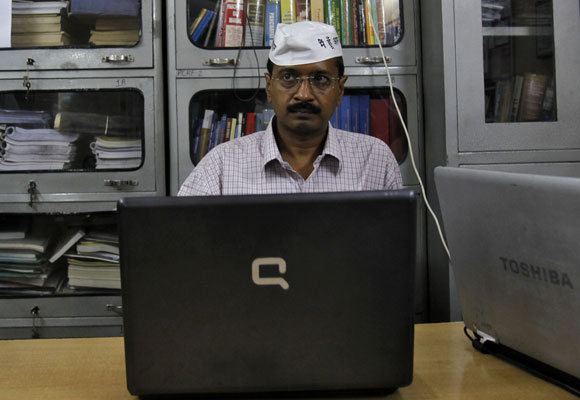The poll promise is an attempt to woo the middle-class and rich voters in the wake of the party’s growing unpopularity, says Sahil Makkar.

Delhi Chief Minister Arvind Kejriwal has promised to waive property tax if the Aam Aadmi Party is voted to power in the city’s three municipal corporations on April 23. The Bharatiya Janata Party is in power in the three municipalities in the national capital.
The poll promise is an attempt to woo the middle-class and rich voters in the wake of the party’s growing unpopularity and its recent debacles in the Punjab and the Goa assembly elections.
The AAP’s vote bank in Delhi is concentrated among unauthorised colonies and the party wants to broaden it to replicate its success in the Delhi assembly elections, which the party had won on promises of free water and electricity.
The abolition of property tax will result in the rich being spared from paying tax.
Municipal corporations will have to provide the same services in authorised and unauthorised colonies because the current categorisation will become irrelevant. The cash-strapped civic bodies will also face greater difficulty in paying salaries to their staff.
The East Delhi Municipal Corporation and the North Delhi Municipal Corporation already bear a huge financial burden.
According to the revised Budget Estimate of 2016-17, the EDMC was sitting on a deficit of Rs 2,041 crore.
It owed Rs 590 crore in wages and pension, Rs 600 crore to paryavaran sahayaks and another Rs 150 crore to its contractors.
The EDMC said the Delhi government was yet to pay its dues of Rs 4,928 crore as recommended by the Fourth Delhi Finance Commission.
The EDMC budget deficit is expected to rise to Rs 2,243 crore in 2017-18. Yet the BJP-ruled body announced populist measures like installing CCTV cameras, exempting residential properties measuring up to 41.81 sq metres from tax, and reduction of conversion charges in the current financial year.
The NDMC budget deficit for 2016-17 was estimated at Rs 2,754 crore and is expected to rise to Rs 3,610 crore in 2017-18.
Despite this, the NDMC announced free mobile phones for 28,000 sanitation workers and permanent jobs to 6,000 daily wagers in this financial year.
If property tax is waived, the biggest loss will be for the South Delhi Municipal Corporation, which collected Rs 775 crore property tax in 2016-17, around 28 per cent of its total internal revenue of Rs 2,755 crore.
The SDMC has revenue surplus, but the loss of property tax will bring it into deficit.
The EDMC’s internal revenue was Rs 1,478 crore in 2016-17, of which property tax contributed 9 per cent, or Rs 128 crore.
The NDMC’s internal revenue in 2016-17 was Rs 2,688 crore and property tax contributed 16 per cent, or Rs 435 crore.
Only 30-35 per cent of residents pay property tax in Delhi as the rest of the population is outside the tax net.
The EDMC has 2,28,000 taxpayers among 4,00,000 property owners, the NDMC has 3,35,000 taxpayers among one million property owners and the SDMC has 4,75,000 taxpayers among its 1.1 million property owners.
IMAGE: Delhi Chief Minister Arvind Kejriwal and Deputy CM Manish Sisodia addressing a press conference in New Delhi. Photograph: PTI Photo











